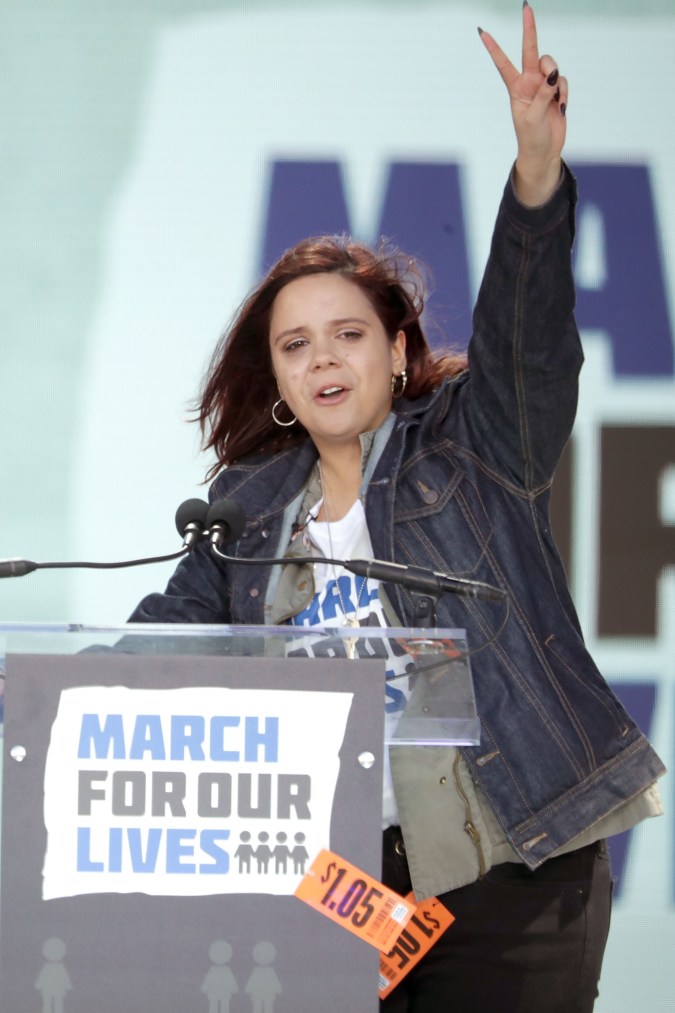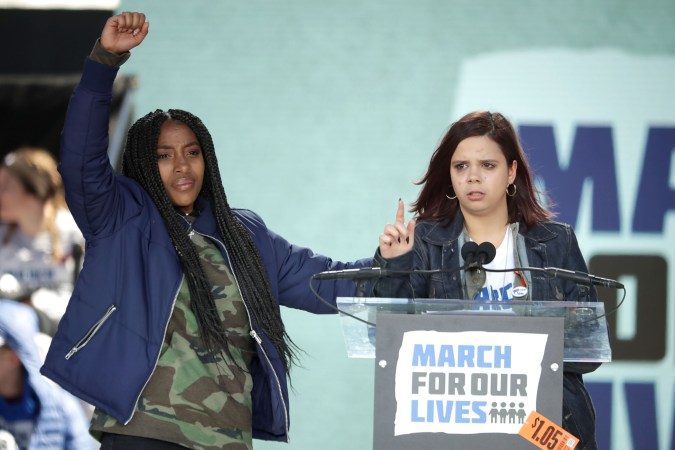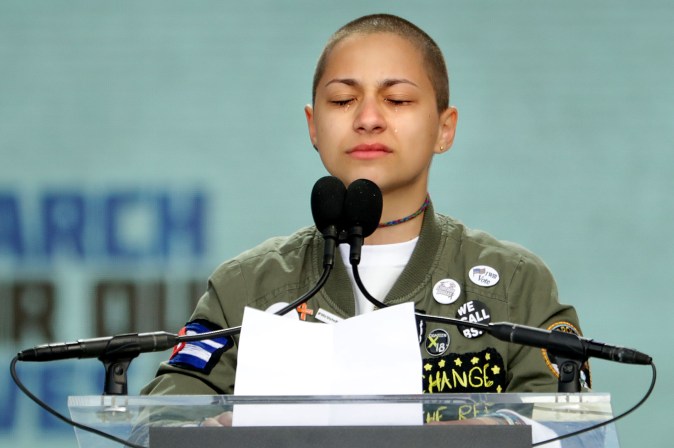Three days after 17 students and staff members were killed by a gunman at Marjory Stoneman Douglas High School in Parkland, Florida, in 2018, the school’s young survivors led a gun-control rally to speak against gun violence and politicians who receive campaign contributions from the National Rifle Association.
One of the survivors who were not at the rally that day was Samantha Fuentes, an 18-year-old, Cuban-American senior from Stoneman Douglas who had been admitted into the hospital with a bullet wound to her leg and severe facial injuries.
In the documentary film Us Kids, Fuentes, along with other survivors from that tragic day like Emma González and David Hogg, are followed as they spark a worldwide gun-control movement to advocate for stricter regulations on gun laws in the United States.
A personal story brimming with pain and pure emotion.
Us Kids is a raw and real glimpse at the young men and women who are at the forefront of what one advocate called a “tectonic shift” in the gun-control movement. Through the eyes of the survivors, filmmaker Kim A. Snyder gives her subjects room to express their thoughts without feeling like they must edit themselves to keep up appearances for the media or for the detractors who attempt to villainize them.

The authentic response captured in the documentary is especially true for Fuentes. Although she is not as recognizable in the movement as González or Hogg, she brings a powerful and personal story brimming with pain and pure emotion. “It’s hard to trust anyone these days, considering a kid that I barely f**king know tried to kill me,” Fuentes says in the film.
During an interview with Remezcla, Fuentes talks about how she feels Us Kids speaks to her trauma, what her role is in the gun-control movement and how the 2018 tragedy has defined who she is today. Us Kids is available to stream at the Alamo Drafthouse Virtual Cinema.
This interview has been lightly edited and condensed for clarity purposes.
Was it therapeutic for you in any way to give access to a director and allow her to tap into the tragic events you experienced?
Yes, it was absolutely healing for me. Initially, it took a lot of trust that had to be built. It was weird seeing it on screen, but the film articulated my trauma in a way that was accurate and understandable to the average person. That’s really important because there’s hundreds of thousands of people out there like me who are survivors of gun violence. There are sufferers of [post-traumatic stress disorder] PTSD and trauma associated with experiencing such a traumatic event. I hope that when survivors watch this film, they can relate and know that they are not alone.
Do you feel like you’ve found your place in the gun-control movement?
The movement is a very large and broad one. I think what is best for most people is to find a close-knit community they can rely on and to communicate ideas and organize with. The film was strategic in finding that group of people that I knew I could talk to. That includes people like Bria [Smith] and David [Hogg] and Emma [González]. We were friends before, but this gave us the opportunity to spend more time together and further advance our cause. Activism is something that can be very isolating at times.

It must have felt very isolating for you after the shooting since many of your classmates quickly switched gears into advocacy and you couldn’t do that right away because of your injuries, right?
Yeah, I was injured and had to be hospitalized and isolated on my own to heal, so I had a delayed start to my activism. I felt like maybe I was behind or too late. But that was certainly not the case. It is never too late to be an activist. As I’ve worked more on the gun-violence prevention movement, I’ve met more and more people who I can call my close friends. Once the wheels start moving, you get to know everybody.
‘Spokesperson’ isn’t really a dignified title, especially because of the origin in which people do activism.
As a survivor from Parkland, you and your former classmates are being looked upon as some of the most important leaders of the gun-control movement. Do you feel pressure in any way to be a spokesperson for this cause?
I think the ‘spokesperson’ in this gun-violence prevention movement are the victims. They’re the reason why most of us fight so hard. ‘Spokesperson’ isn’t really a dignified title, especially because of the origin in which people do activism. So, I hope that when people see me as a figure in this movement, they see what I’m doing as a form of memorializing those we’ve lost. I think every great movement, especially those that have to do with civil rights and human rights, usually started at the point of injustice or the point of tragedy. When we try to put titles like ‘president or founder or representative, I think we step further away from the reason that we do this. I hope people look at me as someone who is trying to uplift the voices of those we’re working for. I feel like I’m working for the hundreds of thousands of people who have been devastated due to gun violence.
According to a September article from Axios that sites numbers from the Federal Election Commission, this year the [National Rifle Association] NRA has only spent 1/6 of what it spent in 2016 on getting their pro-gun politicians elected. What do you think that says about the gun-rights movement and the power of the NRA in comparison to only four years ago?
One very clear thing that has come out of the gun-control movement was that the curtain opened and everyone finally got to see these elected representatives who are supposed to stand for us and voice our opinions. A lot of people in this country agree that we should have basic, universal and common-sense gun laws. That is the conclusion we’ve come to after witnessing many mass shootings and other forms of gun violence. So, when we pulled those curtains and revealed that so many of the people who are supposed to represent us are being funded by organizations like the NRA, it became very clear that gun-violence prevention wasn’t in the story of our politics and our government.
People want to hold their representatives accountable.
We now associate the NRA as being an entity that adds to the violence. People don’t want to be associated with the NRA now because of the negative connotation, which they carry because of the negative things that they contribute to. Gun violence is now a concern within politics. Now, we know where these politicians’ priorities lie. I think [the NRA is] investing less because it’s less profitable for them to invest in people who are running for office. We are moving towards a culture that is now more aware of how politicians obtain their money. People want to hold their representatives accountable.

Do you allow that tragic event you experienced back in 2018 to define who you are today?
I think we all become victims of our own circumstances. We associate one event or one circumstance as the defining factor for the rest of our lives. There are moments like that—defining factors in your life that change you forever. But I don’t think it inherently changed the person I was or am. I think I had the ability to separate my circumstance from the kind of person I wanted to become when I realized that I could use it in a productive way.
I turned my trauma into power.
Activism became something that was mostly out of necessity. I became an activist accidentally. When I realized I could do something constructive instead of just dwell in that moment forever, I realized that moment couldn’t control me. If I could heal and reflect, then I wouldn’t be doomed to constantly relive it in my mind. I was creating new memories and new moments that stemmed from a terrible tragedy. I turned my trauma into power. I turned the most devastating event in my life into something that was worth living for. There is no such thing as forgiving and forgetting, but there is such [a] thing as moving forward.

Since you and Emma González are both Cuban-American, have you been able to connect with her in any way because of that? Is there any commonality there with the culture?
Emma and I have lived in predominantly white or suburban neighborhoods where our culture is not rich or accessible. I grew up being raised by my Cuban grandmother. My first language was Spanish. My dad is an immigrant. Now, I barely speak it and feel really out of touch with my own Hispanic heritage at times. I’m not sure if this is a feeling Emma has personally, but I struggled to embrace who I am because I grew up in a neighborhood where people would intimidate me for the color of my skin. This happened throughout my childhood. It wasn’t until later as a young adult that I realized I am a woman of color. I think my whole life I was kind of just imitating the people around me. I think I’m only now embracing my history and the fact that I’m a Cuban woman.




